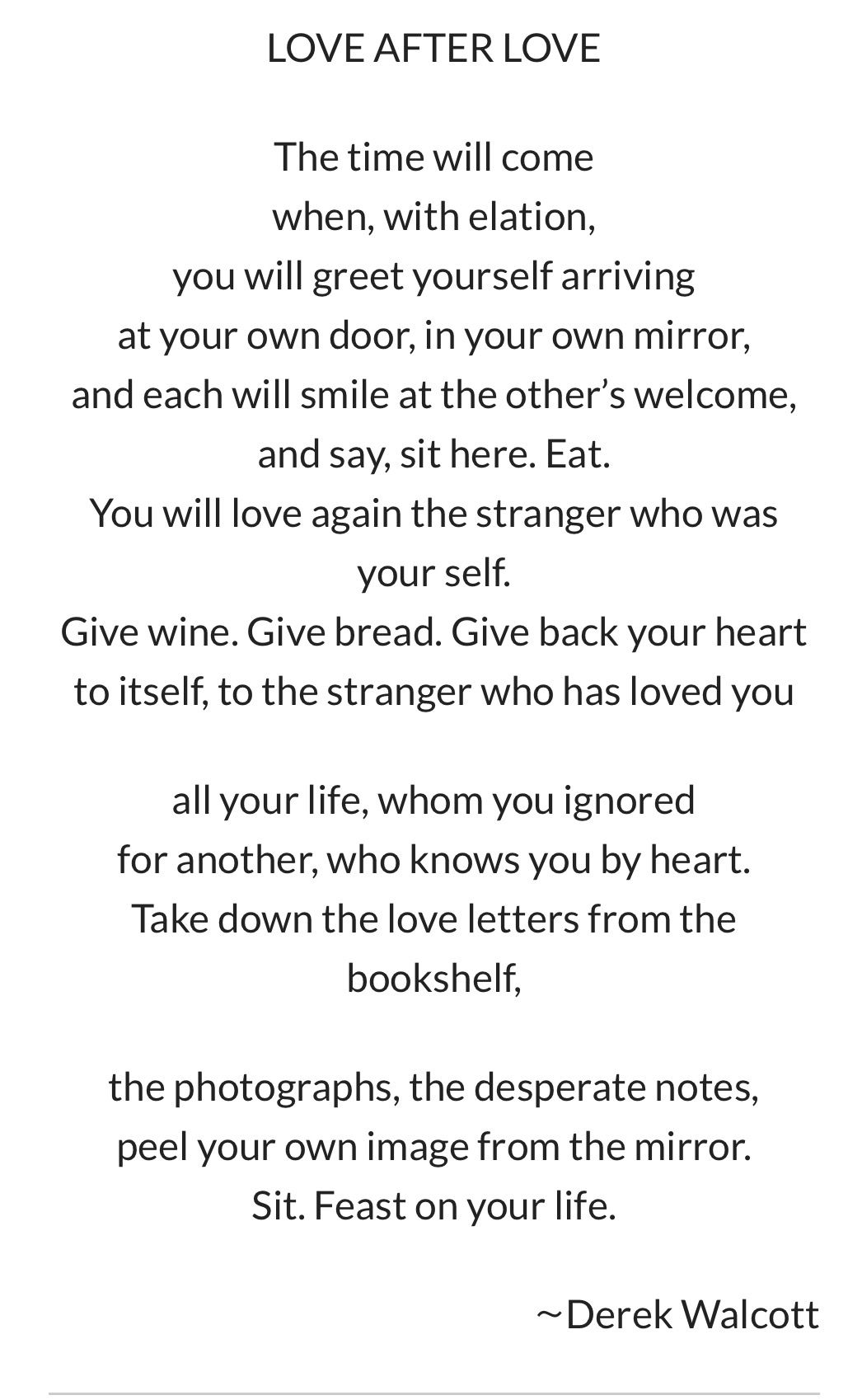Derek Walcott Love After Love Poem

Derek Walcott's "Love After Love" is a profoundly moving poem that explores the themes of self-acceptance and the reconstruction of identity following a period of emotional turmoil. It’s not just about romantic love lost and found; it delves deeper into the necessary journey of self-discovery that allows us to truly connect with ourselves and, consequently, with others. The poem, deceptively simple in its language, offers a powerful message of hope and resilience, suggesting that healing and a deeper understanding of oneself are possible after experiencing pain and loss.
Understanding the Poem's Core Arguments
The Initial State: Emptiness and Alienation
The opening lines of the poem establish a sense of emptiness. We are presented with the aftermath of a relationship, but the focus is not on the other person; it's on the individual’s internal state. The speaker is lost, searching for meaning in a world that suddenly feels foreign. The "stranger" knocking at the door is, in fact, the speaker himself, alienated from his own emotions and self-worth. This feeling of detachment is a common experience after a significant loss. Think about the feeling after a job loss - a disruption to the rhythm of life, leading to self-doubt and questioning one's capabilities.
The Moment of Recognition: Welcoming the Self
The central turning point of the poem lies in the invitation to "welcome" this stranger – to welcome the self. This is not a passive acceptance, but an active decision to confront and embrace the parts of oneself that have been neglected or hidden. It's about recognizing that the individual, in their entirety, is worthy of love and acceptance. It's about acknowledging the flaws and imperfections without judgment, seeing them instead as integral parts of the whole. Think of the process of learning a new skill. Initially, there are frustrations and setbacks, but embracing those challenges, rather than rejecting them, leads to mastery.
The Banquet: Nourishment and Self-Love
The metaphor of the "banquet" is crucial. It signifies a feast of self-love and self-acceptance. The speaker is encouraged to "smile" at his own image in the mirror, to "sit" and "feast" on his life. This isn't about ego or narcissism; it's about recognizing and appreciating the inherent value of one's own existence. It's about finding joy in one's own company and nourishing the soul with positive self-regard. This act of self-nourishment is essential for healing and growth. Imagine a gardener tending to a neglected plant. They provide water, sunlight, and nutrients, nurturing it back to health. Similarly, we must nurture ourselves with self-compassion and kindness.
The Journey of Transformation: From Stranger to Friend
The poem culminates in the realization that the "stranger" is, in fact, a long-lost friend. This friend represents the authentic self, the person that was hidden beneath layers of insecurity and pain. By welcoming this stranger, the speaker is essentially rediscovering and reintegrating their true identity. This is a transformative process, one that requires courage and vulnerability. This rediscovery is likened to meeting a long-lost friend. After many years apart, there's an initial hesitation, but once the connection is re-established, it feels natural and familiar.
Real-World Applications and Examples
The themes explored in "Love After Love" resonate deeply with real-world experiences. Consider the following examples:
* Divorce or Break-Up: After a relationship ends, individuals often struggle with feelings of inadequacy and self-doubt. Walcott's poem offers a framework for navigating this difficult period by encouraging self-acceptance and the rediscovery of personal identity outside the context of the relationship. It's about recognizing that one's worth is not defined by another person's love. * Job Loss or Career Transition: Losing a job can be a devastating experience, leading to feelings of worthlessness and anxiety. The poem's message of welcoming the "stranger" can be interpreted as an invitation to explore new possibilities and embrace a new career path. It's about seeing the job loss as an opportunity for growth and self-discovery. * Overcoming Addiction: The journey to recovery from addiction is often marked by periods of self-loathing and despair. Walcott's poem can be seen as a guide for cultivating self-compassion and building a new identity free from the constraints of addiction. It's about recognizing that one is worthy of love and recovery, despite past mistakes. * Dealing with Trauma: Individuals who have experienced trauma often struggle with feelings of shame and self-blame. The poem's message of self-acceptance can be particularly empowering, helping them to heal from their wounds and reclaim their lives. It's about acknowledging the pain of the past without letting it define the future. * The experience of Immigrants: Immigrants often struggle with feelings of displacement and identity confusion as they adjust to a new culture. Walcott, himself of Caribbean descent, likely understood this acutely. The poem's invitation to welcome the "stranger" can be interpreted as an encouragement to embrace their dual identities and find a sense of belonging in their new home. It's about integrating their past experiences with their present reality. Consider, for example, someone emigrating from Syria to The Netherlands. Everything is different; the language, the culture, the people. Welcoming the "stranger" is welcoming the new version of themselves, forged by this transition.Deeper Analysis of Poetic Devices
Metaphor and Symbolism
The poem is rich in metaphors and symbolism. The "stranger" is a metaphor for the neglected self. The "door" represents the barrier between the conscious and subconscious mind. The "mirror" symbolizes self-reflection and the ability to see oneself clearly. The "banquet" is a symbol of self-nourishment and self-love. Recognizing these literary devices unlocks a deeper understanding of the poem.
Language and Tone
Walcott employs simple, accessible language, which makes the poem relatable to a wide audience. The tone is initially somber and reflective, but it gradually shifts towards hope and optimism. This shift in tone mirrors the speaker's emotional journey from despair to self-acceptance. The initial lines are tinged with sadness, but as the poem progresses, a sense of joy and liberation emerges.
Structure and Form
The poem is written in free verse, which allows for a natural and conversational tone. The lack of a rigid rhyme scheme or meter contributes to the poem's sense of authenticity and immediacy. The poem's structure mirrors the cyclical nature of healing and self-discovery. It starts with a sense of emptiness, progresses through a period of self-reflection, and culminates in a state of wholeness and self-acceptance.
Conclusion: A Call to Self-Acceptance
Derek Walcott's "Love After Love" is more than just a poem; it's a guide to self-acceptance and emotional healing. It reminds us that we all have the capacity to overcome adversity and rebuild our lives after experiencing loss and pain. The poem challenges us to confront our inner demons, embrace our imperfections, and cultivate a deep and abiding love for ourselves. The poem's final message is clear: true love begins with self-love. Start today. Take a moment to look in the mirror, smile at your reflection, and acknowledge the beauty and strength within you. Welcome the stranger; welcome yourself.


Bekijk ook deze gerelateerde berichten:
- Anne Van Der Meulen
- Voor Wie Ik Liefheb Wil Ik Heten Analyse
- Waar Komt De Naam Schiphol Vandaan
- Europa Oefenen Landen En Hoofdsteden
- Wie Is De Mol Wie Is Eruit
- Van A Naar B Duitsland
- Wat Kan Je Worden Met Pedagogiek
- Calculation Of Price Elasticity Of Demand
- Waar Kan Je Juf Braaksel Kijken
- Waaruit Bestaat De Afbeelding Op De Olympische Vlag
